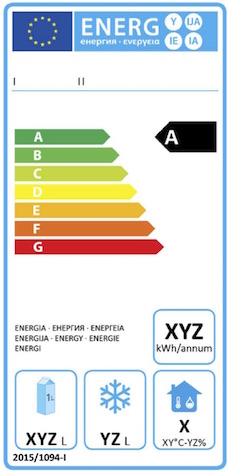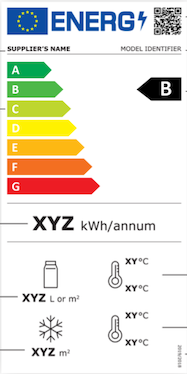This page gives an overview of EU regulations concerning plug-in refrigeration equipment such as beverage coolers, ice cream freezers, refrigerated display cabinets, storage refrigerator and freezers, wine coolers, minibars etc.
Storage refrigerators & freezers
 Since 1 July 2016, the EU energy label for professional refrigerated storage cabinets is mandatory. It shows:
Since 1 July 2016, the EU energy label for professional refrigerated storage cabinets is mandatory. It shows:
- the energy efficiency class
- the annual electricity consumption in kWh per year,
- the sum of the net volumes of all chilled compartments functioning at chilled operating temperature,
- the sum of the net volumes of all chilled compartments functioning at frozen operating temperature,
- and the climate class (3, 4 or 5) together with the associated dry bulb temperature (in °C) and the relative humidity (in %).
Document: Commission delegated regulation (EU) 2015/1094
The Eco Guide from Electrolux gives a good introduction to the new label.
Requirements for energy efficiency of professional refrigerated storage cabinets:
- Since 1 July 2016: EEI < 115
- Since 1 January 2018: EEI < 95
- Since 1 July 2019: EEI < 85
Heavy-duty cabinets must only meet the first stage of the requirements (since 1 July 2016: EEI < 115).
Refrigerator-freezers and blast cabinets are excempt from the label and do not have to meet any requirements for energy efficiency. But product information concerning energy consumption has to be provided in the instruction booklet and on websites since 1 July 2016:
- For refrigerator-freezers: the complete set of specifications (see in original document below) except not the EEI but instead the indicative daily energy consumption
- For blast cabinets: the full load capacity of the cabinet (kg), the standard temperature cycle (from X°C down to X°C in X minutes), its energy consumption (kWh per kg) and type, name and GWP of the refrigerant
Document: Commission regulation (EU) 2015/1095
| Policy overview and comments in the Policy Recommendations |
Refrigerated display cabinets
An EU energy label for commercial refrigerated display cabinets has been adopted in 2019. It will come into effect on 1st March 2021. This mandatory label for plug-in and remote supermarket cabinets, beverage coolers, ice-cream freezers and refrigerated vending machines will show:

- QR Code
- the energy efficiency class
- the annual electricity consumption in kWh per year,
- the sum of the net volumes of all chilled compartments functioning at chilled operating temperature,
- the sum of the net volumes of all chilled compartments functioning at frozen operating temperature,
- and the temperature class (indicated by the warmest temperature of the warmes m-package and the lowest temperature of the coldest m-package).
- Ice-cream freezers and beverage coolers: the climate class as indicated by the warmest ambient temperature
Document: Commission delegated regulation (EU) 2019/2018
Requirements for energy efficiency of commercial display refrigerators with a direct sales function:
- From 1 March 2021:
- EEI < 80 for ice-cream freezers
- EEI < 100 for all other refrigeration appliances with a direct sales function
- From 1 September 2023:
- EEI < 50 for ice-cream freezers
- EEI < 80 for all other refrigeration appliances with a direct sales function except refrigerating drum vending machines
Stricter requirements in Switzerland apply. Beverage coolers and vertical supermarket cabinets must meet the same requirements as ice-cream freezers in tier 1. In tier 2, beverage coolers and ice-cream freezers must be EEI < 50, vertical supermarket cabinets EEI <65.
Document: Commission regulation (EU) 2019/2024
| Comments in the Policy Recommendations |
Minibars and wine coolers
Minibars and wine coolers intended for commercial use have been included in the scope of the revised EU energy label for household refrigerating appliances that will come into effect on 1st March 2021.
Ban of the refrigerants R404A and R134a in 2020/2022 (F-Gas)
According to EU Regulation No. 517/2014 ("F-Gas Regulation") refrigerators and freezers for commercial use (hermetically sealed equipment) that contain HCFs with global warming potential of 2500 or more have been banned from 1 January 2020 and those that contain HFCs with global warm potential of 150 or more will be banned from 1 January 2022.
All models listed on Topten already use the natural refrigerants R290 (propane), R600a (isobutane) or R744 (CO2) with global warming potential (GWP) below 4.
The global warming potential is 1000 - 4000 times lower than that of previous refrigerants like R134a or R404A.
R404A has a GWP of 3990 and will be banned in 2020 and R134a has a GWP of 1430 and will be banned in 2022.
Document: Regulation (EU) 517/2014
Infoplus
- ProCold Publishable Report, project results 2016-2018, July 2018
- ProCold Technical Report, market overview and development 2016-2018, April 2018
- Converting ice-cream freezers from R404A to R290, article in hydrocarbons21.com's industry news, 26 July 2016.
- CO2 vending machines at Venditalia 2015, article in R744.com's events news, 6 May 2015.
Back to the ProCold project main page
ProCold is an EU-project aiming to improve energy efficiency in plug-in refrigeration equipment and speed up the switch to climate-friendly refrigerants. Objectives of the project:
- Showcasing best products
- Supporting green procurement
- Helping to implement effective policies

The sole responsibility for the content of the «ProCold» project lies with the authors. It does not necessarily reflect the opinion of the European Union. Neither the EASME nor the European Commission and the project partners are responsible for any use that may be made of the information contained therein.
